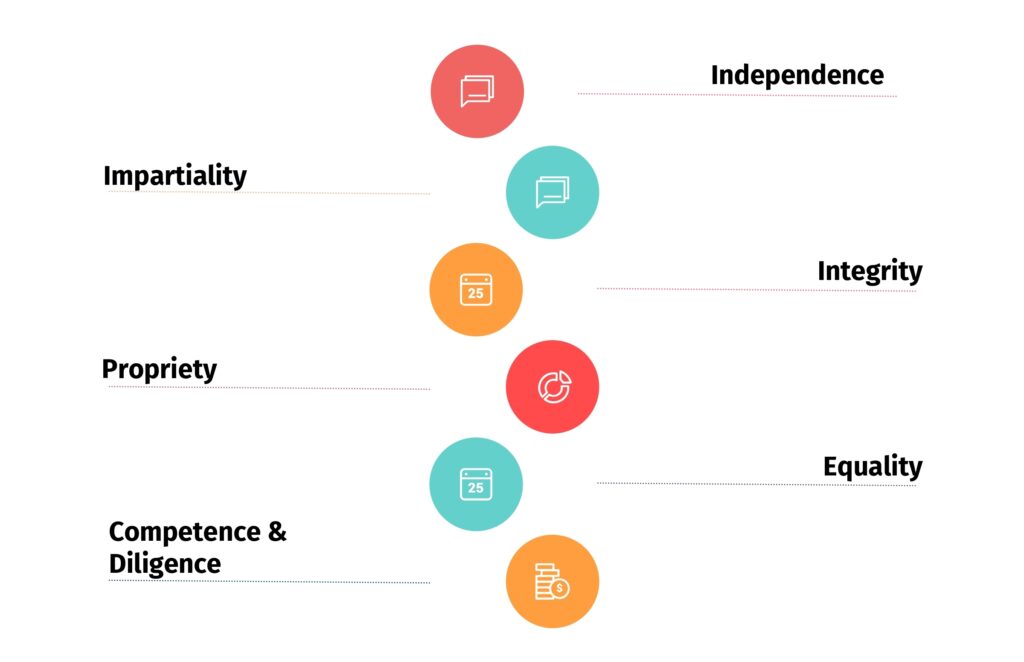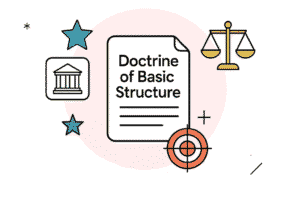“The greatest strength of the judiciary is the faith of the people in it.” But what fuels that faith? One word: Ethics. Judicial ethics are the invisible yet powerful force that underpins the trust people place in the legal system.
In a world where justice must not only be done but also be seen to be done, ethical conduct becomes paramount. Judges are entrusted with making decisions that affect lives, and their actions must always reflect the highest standards of fairness and respect for the law.
What Are Judicial Ethics, Really?
Judicial ethics go beyond mere guidelines; they are a way of life for judges. This responsibility is not confined to a 9-to-5 job; it is a 24/7 commitment to upholding the law, serving society, and maintaining personal integrity. Judges must embody these ethics in every decision, at all times, both in and out of the courtroom.
Definition
Judicial ethics are a set of standards and values that govern the behavior, decisions, and public presence of a judge, ensuring that justice is delivered impartially, without bias, influence, or impropriety. Judges are not merely legal professionals; they are symbols of fairness and trust in society.
The Six Pillars of Judicial Integrity

Here’s what forms the unshakable foundation of ethical judicial conduct:
1. Independence
A judge must be fearlessly independent, free from any external pressures or influences, whether from the government, media, or personal relationships, ensuring that decisions are based solely on the law and facts of the case, without any bias or external interference.
Decisions should reflect facts and the law; not politics, pressure, or popularity.
2. Impartiality
A judge must maintain complete objectivity, free from any favoritism or prejudice. Even the slightest appearance of bias can undermine public trust in the judicial system and its ability to deliver fair justice.
Judges should avoid commenting on ongoing cases or engaging in any behavior that could be seen as partial.
3. Integrity
Judges must be above reproach, both inside and outside the courtroom. From financial dealings to social behavior; honesty is non-negotiable.
Integrity builds public confidence. Without it, the judiciary crumbles.
4. Propriety
This means acting with dignity and restraint at all times, both on and off the bench. A judge’s personal life must align with the values of the court, as their actions outside the courtroom should reflect the integrity and impartiality expected of their judicial role.
No conflicts of interest, no misuse of position, and no questionable associations.
5. Equality
Justice isn’t justice unless it’s for everyone. Judges must treat all parties equally; regardless of gender, religion, caste, background, or identity.
Inclusivity and respect are non-negotiable principles of fairness.
6. Competence & Diligence
Being ethical also means being efficient, updated, and hardworking. Judges must keep learning, stay current with the law, and deliver judgments promptly.
No room for delays or carelessness; justice needs commitment.
Ethics: A Continuous Journey, Not a Destination
Judicial ethics evolve with society, adapting to changes in cultural norms, values, and expectations. Judges must stay engaged through continuous learning, reflecting on emerging societal issues, and ensuring their decisions align with both the law and the evolving principles of justice.
- Seminars & workshops
- Self-reflection
- Ethics-based decision-making models
- Open discussions with peers
In a rapidly changing world, judges face new challenges; social media scrutiny, digital privacy, AI in legal research, each bringing new ethical crossroads.
The Indian Context: A Mirror of Public Trust

In India, where the judiciary often serves as a guardian of democracy, ethical conduct is the bedrock of its credibility. As the nation grows, so does the public’s expectation of transparency and accountability.
Judges are no longer just interpreters of law; they are role models of fairness.
Final Verdict: Ethics Are the Heartbeat of Justice
In every ruling, every courtroom moment, every public appearance, judicial ethics shine through.
They ensure that judges don’t just deliver justice, but deliver it with honor, clarity, and consistency. Unlocking public trust begins with ethical conduct.
Want to Learn More?
Check out our curated notes and in-depth resource document on Judicial Ethics 📝 Whether you’re a judiciary aspirant, law student, or concerned citizen, this is your key to understanding the moral compass of our courts.
Remember:
Judicial power is sacred. Ethics keep it clean. And in ethics, lies the enduring strength of the judiciary with Edzorb Law.










 Features
Features






